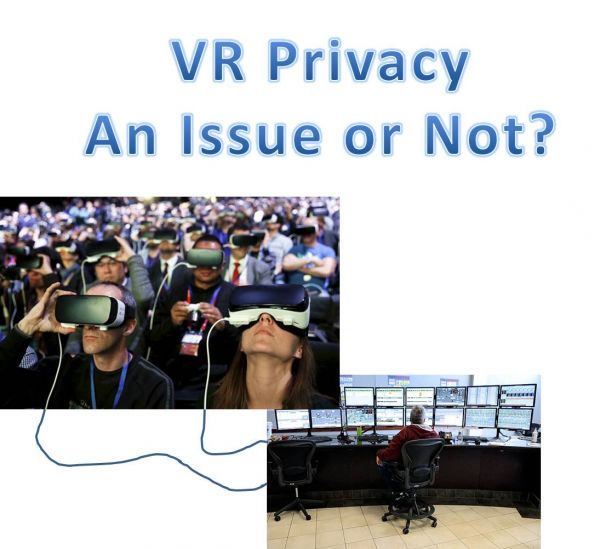Some time ago I wrote about the philosophical privacy issue that surround the augmented and virtual reality in general (How Private do You Think You are in a Virtual World? – subscription needed). In addition Facebook has stirred up the discussion by releasing their privacy guidelines as they pertain to the just released Oculus Rift. In another article, I reported on the Oculus privacy policy as published on its website. As I pointed out then, the wording used by Oculus leaves a lot of wiggle room for corporate development by using the user information beyond the name and e-mail address.

In an interview of Jason Rubin from Oculus (as published by the Associated Press), it was pointed out that Senator Al Franken from Minnesota has raised concerns about the privacy of the average user. I can easily imagine that the Senator got this concern from one of his staff member reading the privacy policy and wondering what some of the wording may mean. Rubin from Oculus was quick to respond by saying that all “will be fine” and the technology just means nothing bad for the consumer. As a matter of fact, the privacy policy will protect the consumer from any misuse and they will all get used to this very quickly. Interesting.

Analyst Comment
First of all, I believe that the privacy policy was not written to protect the consumer, but the company from law suits of consumers who see their personal information used in a way they disapprove of. Further, based on the very specific wording I also believe that Facebook / Oculus have already got very clear ideas on how they are going to use such information. The quick rise of Mark Zuckerberg to one of the richest billionaires in the US shows that he has a very keen understanding of business potential.
In this regard I would compare Zuckerberg to Bill Gates. So far, he has been very successful in his business ventures and to make it clear, he bought Oculus at a time when articles about VR were being written exclusively for geek circles. The amount of money he spent on Oculus shows that he believes in the large business potential this technology has.
The latest Facebook conference has already incorporated VR as one technology expected to revolutionize the social media landscape in the not so far future. So, this leaves us with the question of whether privacy concerns could derail Zuckerberg’s view in any way.
If the politicians are now taking note of this technology, there is a chance that the U.S. Congress will look into these new technologies in more detail in the coming year – and don’t forget that this is an election year in the US. For the rest of the world, this means more than just electing a new president. A significant number of representatives and senators are also facing re-election, meaning that it will look good for them to represent themselves as the defender of personal freedom and privacy (by the way, Senator Franken is not up for re-election this year).
Besides the political motivation for some of these concerns, there is a real question of how much privacy the consumer will give up while using these new technologies. From a more historical perspective, new technologies in the past few decades have not been creating more privacy protection software because the technologies are inherently private. This is just the opposite. With you carrying a turned on smartphone, cellular networks know within a few miles where you are all day long.
Yes, in the case of an emergency (car accident, medical emergency, etc.) this sounds like a good thing, as for the rest of the time it is as though ‘big brother’ is watching you. Interestingly, almost all of us do not care and believe that their privacy is protected by laws. In addition, social media have led people to publish private information to a degree never imagined before. From this perspective one could argue that the population has adapted to a more open lifestyle, where privacy is not as high a concern as it has been for the last decades.
On the one hand there is the question of whether this potential loss of privacy in VR and AR applications will influence the adoption rates of such technologies; on the other hand there is the drive to improve the experience and usefulness of AR / VR by looking at the usage patterns of the respective content. And that is where it gets very tricky.
I would agree with Oculus that collecting and analyzing VR user data will help them to develop new apps that serve the consumer better. This in turn will make the technology more interesting to the consumer leading to higher adoption rates. There seems nothing wrong with this point of view as long as the consumer enjoys the improved experience.
The real question is what the data is used for beyond this hardware and software optimization. Oculus can collect data for marketing purposes. I leave it up to you to decide if you want to meet Ronald McDonald in your virtual space, in the case that the headset determines that you are hungry.
One of the potential consequences will be that advertising will become so targeted that it will become more and more difficult to ‘just say no’. That will be the case at least for the older generations that already have issues with resisting TV shopping networks. The younger generations will adapt quickly to this marketing style of knowing what I want before I even realize it myself, but the older generation will treat it as a kind of magic.
This leads to the question of whether this kind of advancement in consumer electronics is something worth the loss of privacy. I believe that this question will be answered differently by the various consumer groups and maybe an issue that could easily swing in one direction or the other. In no case do I think that this is a non-issue as Oculus suggests.
This could easily become a stumbling block for VR comparable to the social awkwardness issue that (at least partially) killed the Google Glass project as a consumer product. – Norbert Hildebrand

